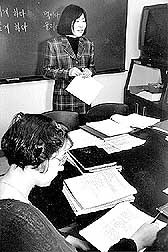Princeton Weekly Bulletin February 22, 1999
Enterprise of lifetime
University employees continue their education by taking undergraduate courses for credit
By Caroline Moseley
|
|
|
|
Research aide Kara Wortman (l) in
Korean class
|
"There are almost as many reasons for taking courses as there are courses to take," notes Assistant Dean of the College Harold McCulloch, who has directed the program since 1993.
Rita Saltz, associate director of Information Services, took Contemporary Drama because of "a lifelong interest in the theater," she says. Valerie Van Selous, a research analyst in Development, took Introduction to Architectural Thinking "to broaden my understanding of buildings and their designers."
Nilza Gallego, a clinical assistant at McCosh Health Center, took bio-chemistry because she wants to apply to medical school, and she's taking introductory psychology this semester "just because I'm interested." Kara Wortman, research aide for the Chinese Linguistics Project and coordinator of Princeton in Beijing, is studying Korean; a member of the Class of '98, she hopes eventually to enter graduate school. Bill Sproule, a systems programmer for CIT, is an emergency medical technician; he's taking molecular biology "to learn more about how the body works."
In all cases, says McCulloch, the Continuing Education program "allows staff members to avail themselves of the rich educational opportunities Princeton offers." Continuing Education students are completely integrated into their courses, participating in classes, precepts, labs, workshops and studios. They complete all course requirements, including writing papers and taking exams.
Supervisor's role
How does a full-time University employee manage the course time and work? "I treated the course as a lunch hour," says one. "I had two lectures and a precept, so the amount of time I was absent from the office was equivalent to taking lunch (though not at lunch time)." This student adds, "It's important to stress the role a supervisor plays in allowing or encouraging staff members to pursue continuing education opportunities. I know that if I had to stick rigidly to a nine-to-five schedule, I could not have pursued this dream."
Course readings, says Saltz, "I did at night and over the weekends, forgoing whatever reading I might have done otherwise." And, yes, sometimes time runs short. Though Saltz began her first paper "a few weeks before it was due, because it was the first real course paper I'd done in more than 30 years," her second paper was done "quickly and without much time for refining" because of work-related pressures.
Still, University employees may have time-management skills unknown to regular students. Wortman observes that "working an adult job has made me much more efficient" and she has "much more disciplined study habits" than she had as an undergraduate. Why enroll in a course rather than audit? Says Saltz, "I'm so duty-bound that I feared if I audited I'd let the course slide at the first work-related crisis. Taking it for credit meant I gave it a kind of 'equal billing' in terms of commitment." Acknowledges Gallego, "It's a lot of work, definitely a challenge -- but a wonderful opportunity."
Refreshing
Continuing Education students describe their experience as "stimulating" and "refreshing." In addition, they enjoy contact with the Princeton students, who, says Saltz, are "not just very bright; they're interesting, astute, insightful, funny, creative fascinating people."
McCulloch emphasizes that Continuing Education students generally take undergraduate courses. In rare instances they may take graduate courses, but, he cautions, Continuing Education "is not a back door into graduate programs." He also notes that Continuing Education courses "do not apply towards a Princeton degree." However, grades are recorded on a Princeton transcript that can be presented for transfer credit at other institutions, if the student desires.
McCulloch likes to interview first-time applicants to the program; in addition, he's "always available" for guidance when potential students are unsure about "any aspect of the venture -- what department, what course, what level."
Reduced tuition for employees
The Continuing Education program is also available to area residents, McCulloch points out. "In a given semester, there will be about 20 students from outside the University and between five and 10 from within the University family."
And while tuition for 1998-99 is $3,080 per course (the same as the per-course tuition charged to Princeton undergraduates), University employees who have worked at least half-time for six months pay only $513. Employee spouses, domestic partners and dependents, as well as retired employees and their spouses, and the spouses of graduate students pay $1,540 per course.
Application materials include an application form with biographical and educational information and a statement of academic purpose; transcripts of all college-level and graduate work; results of any standardized tests; and two letters of academic reference. There is an application fee of $25.
To staff members nervous about applying, Gallego says, "No problem. Dean McCulloch and Christine Brown take you through the whole process."
So if you're interested in continuing your education, University employees should contact Christine Brown in Human Resources at 258-2405, and area residents should contact Blanche Scioli in the Office of Community and State Affairs at 258-0202.
